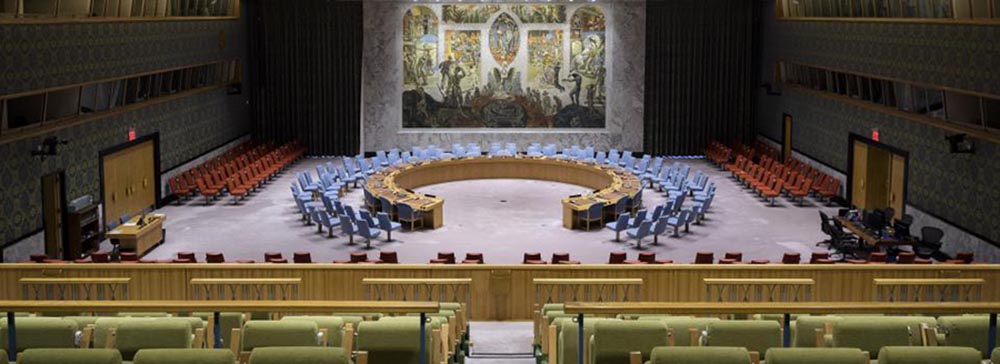Guyana will today ask the United Nations Security Council (UNSC) to consider Venezuela’s breach of its obligations and planned actions which it feels amount to a “direct threat” to this country’s peace and security as well as that of the entire region.
While Guyana could expected support from three of the five permanent members: the United States, Britain and France, how Russia and China respond will be of great interest. There is the view in some quarters that Russia is using Venezuela’s President Nicolas Maduro to stir trouble in the region. China is also a close ally of Venezuela and also has strong ties with Guyana.
CARICOM will also hold an emergency meeting today to discuss the growing tensions, and particularly Caracas’ violation of the International Court of Justice’s directives and what it means for the regional bloc, sources say. At that meeting, this newspaper understands, Heads of State will hear “directly from President Irfaan Ali.”
“We have written to the President of the Council… for the council to take note of that and act as they see fit,” a source told the Stabroek News.
Today’s meetings stem from Venezuelan President Maduro’s defiance of the ICJ orders and his follow-up actions on the December 3 referendum, including the declaration of Essequibo as a new military zone and the establishment of departments of the state-owned oil and mining companies to explore for oil and gas, and mine in the Guyanese county. Maduro has also announced that foreign companies in concessions that have been awarded by Guyana would have to leave within three months.
The 15-member Security Council will peruse documents from Guyana that outline the reasons for approaching the only United Nations body that has the authority to issue resolutions that are binding on member states, seeking it to deliberate and pronounce on the matter. The council is made up of representatives from the five Permanent Members – the United States, China, France, Russia and the United Kingdom – which hold veto powers. The 10 Non-Permanent members are Albania, Brazil, Ecuador, Gabon, Ghana, Japan, Malta, Mozambique, and Switzerland. Brazil’s stance will also be of key interest. The Council’s President is rotated on a monthly basis with Ecuador’s José de la Gasca is currently performing those functions.
This country will point the UNSC to the facts that Maduro has in particular, announced Venezuela’s rejection of the International Court of Justice as the means of settlement of its dispute with Guyana over the Essequibo Region, a court action that was triggered by UN Secretary General, Antonio Guterres.
Guyana’s Minister of Foreign Affairs, Hugh Todd and Vice President Bharrat Jagdeo yesterday stated that this country was grateful that the UN body would consider this country’s Guyana’s request for its intervention.
“Tomorrow, the United Nations Security Council would be considering the request from Guyana… we’re extremely pleased that they have taken up this matter with this sense of urgency,” Jagdeo told a press conference at the Office of the President.
Foreign Affairs Minister, Hugh Todd, explained that Guyana wants the body to “deliberate” on the information it shared and decide on procedures it would enact, given the gravity of the situation.
Bloomberg on Wednesday also reported on a likely mediatory role for Brazilian President Luiz Inacio Lula da Silva, who it says has long tried to position himself as an independent arbiter in global conflicts and now faces the uncomfortable possibility of having to mediate the crisis between Venezuela and Guyana.
Bloomberg said that Lula, a traditional ally of Venezuela’s Maduro and the late Hugo Chavez, spent hours in meetings with his top foreign advisers yesterday to discuss the conflict, considered highly sensitive by Brazil’s diplomacy, the officials said, while requesting anonymity since such conversations aren’t made public. The officials also said Lula is planning to call the presidents of both countries over the next few days.
According to Bloomberg, things could get even more complicated if Vladimir Putin – a close backer of Venezuela’s socialist regime – also steps in amid a possible meeting with Maduro in Moscow this month, the officials said.
One of Lula’s main concerns now, Bloomberg said, is to signal to Guyana and the world that his government isn’t automatically aligned with Caracas despite its political closeness.
“While Brazil understands Venezuela’s reasons to claim Essequibo as part of its territory, it doesn’t have an official position on which country has the right to occupy the region, the officials said.
“More importantly, they added, Brazil doesn’t agree with the strategy employed by Caracas – calling a vote to ask the population, among other things, whether Essequibo should become a Venezuelan state – and much less with Maduro’s timing. His December 3 referendum was widely seen by political analysts as a strategy to rally voters with a nationalistic rhetoric ahead of next year’s presidential elections,” Bloomberg reported.





